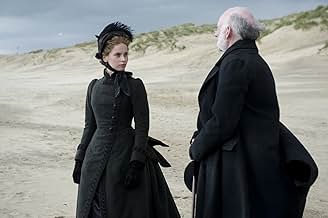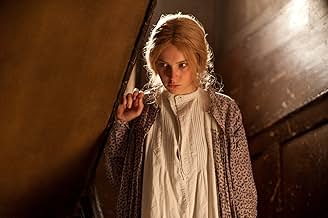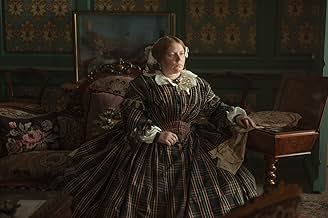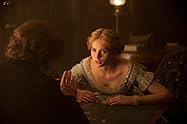NOTE IMDb
6,1/10
11 k
MA NOTE
Au sommet de sa carrière, Charles Dickens rencontre une jeune femme qui deviendra son amante secrète jusqu'à sa mort.Au sommet de sa carrière, Charles Dickens rencontre une jeune femme qui deviendra son amante secrète jusqu'à sa mort.Au sommet de sa carrière, Charles Dickens rencontre une jeune femme qui deviendra son amante secrète jusqu'à sa mort.
- Réalisation
- Scénario
- Casting principal
- Nommé pour 1 Oscar
- 1 victoire et 7 nominations au total
Ralph Fiennes
- Charles Dickens
- (as Mr. Ralph Fiennes)
Felicity Jones
- Nelly
- (as Ms. Felicity Jones)
Kristin Scott Thomas
- Mrs. Frances Ternan
- (as Ms. Kirstin Scott Thomas)
Tom Hollander
- Wilkie Collins
- (as Mr. Tom Hollander)
John Kavanagh
- Rev. William Benham
- (as Mr. John Kavanagh)
Tom Attwood
- Mr. Lambourne
- (as Mr. Tom Atwood)
Susanna Hislop
- Mary
- (as Ms. Susanna Hislop)
Tom Burke
- Mr. George Wharton Robinson
- (as Mr. Tom Burke)
Tommy Curson-Smith
- Geoffrey
- (as Mr. Tommy Curson-Smith)
David Collings
- Governor
- (as Mr. David Collings)
Michael Marcus
- Charley Dickens
- (as Mr. Michael Marcus)
Perdita Weeks
- Maria Ternan
- (as Ms. Perdita Weeks)
Richard McCabe
- Mr. Mark Lemon
- (as Mr. Richard McCabe)
Gabriel Vick
- Mr. Berger
- (as Mr. Gabriel Vick)
Mark Dexter
- Mr. Augustus Egg
- (as Mr. Mark Dexter)
Joseph Paxton
- Mr. Pigott
- (as Mr. Joseph Paxton)
Sophie Russell
- Miss Ellen Sabine
- (as Ms. Sophie Russell)
Christos Lawton
- Mr. Evans
- (as Mr. Christos Lawton)
Avis à la une
The titular Invisible Woman is Nelly Ternan, the young woman who became Charles Dickens' (1812-1870) mistress. How this liaison came about was a complete surprise to me and therefore must remain unsaid since it would IMO constitute a spoiler (most folks plow right through spoiler alerts anyway so that won't work). Nelly is played by Felicity Jones and Kristin Scott Thomas plays Nelly's mother, both who are more than competent but who have unspectacular roles.
It's all Ralph Fiennes who plays Dickens as ebullient, enthusiastic, and even flamboyant and is given a great opportunity to shine, which he does.. He also directs and was not originally set to play the lead but they couldn't find anyone else. Fiennes dominates the film so and yet the best parts for me was the work of an actress named Joanna Scanian who plays poor Mrs Dickens. Short and rotund and with an appearance of possible simple-mindedness (first impression) she rallies and practically steals the show. She is intelligent, perspicacious in how she views her husband, and is quietly courageous in an awkward scene with Nelly.
After reading the separation letter from Charles, her breakdown is severe yet restrained exhibiting an extraordinary piece of slice-of-life acting. If Charles likeability, which is considerable, is to make us forgive him for his treatment of his wife, it will have to withstand the effect of her scenes, which makes us look at him more harshly. And yet she doesn't attack him directly, it's her person that effects us (and with very little screen time). After reading a little of the history, the film seems a faithful rendering.
It's all Ralph Fiennes who plays Dickens as ebullient, enthusiastic, and even flamboyant and is given a great opportunity to shine, which he does.. He also directs and was not originally set to play the lead but they couldn't find anyone else. Fiennes dominates the film so and yet the best parts for me was the work of an actress named Joanna Scanian who plays poor Mrs Dickens. Short and rotund and with an appearance of possible simple-mindedness (first impression) she rallies and practically steals the show. She is intelligent, perspicacious in how she views her husband, and is quietly courageous in an awkward scene with Nelly.
After reading the separation letter from Charles, her breakdown is severe yet restrained exhibiting an extraordinary piece of slice-of-life acting. If Charles likeability, which is considerable, is to make us forgive him for his treatment of his wife, it will have to withstand the effect of her scenes, which makes us look at him more harshly. And yet she doesn't attack him directly, it's her person that effects us (and with very little screen time). After reading a little of the history, the film seems a faithful rendering.
So much so that her husband forgets to name her when introducing his family. Charles Dickens was always fascinated by very young, slender, virginal girls, they are venerated in all his novel. His wife had been such a girl when he married her, but after giving him ten children in a period without anesthetic, she has naturally gained weight and aged. He may tell himself the classic, "my wife doesn't understand me," but it's clear he really just wants a new young, slender girl. The film itself doesn't seem to buy the story that his wife is intellectually boring but instead clearly shows Dickens flinching in disgust when he looks at his wife.
Neither are we shown any brilliance of mind in Nelly as the actress maintains a slack jawed, rabbit-like expression through most of her scenes.
Most biographies depict Dickens as not only treating his wife as invisible, but openly ridiculing her and inventing ways to be cruel to her. We see an example of that here when he makes her take his gift of jewelry to his mistress.
Why we should find this affair romantic I don't know. It's boring and trite and, worst of all, taints any future reading of his novels. A film about the life of Catherine Dickens sounds much more interesting.
Neither are we shown any brilliance of mind in Nelly as the actress maintains a slack jawed, rabbit-like expression through most of her scenes.
Most biographies depict Dickens as not only treating his wife as invisible, but openly ridiculing her and inventing ways to be cruel to her. We see an example of that here when he makes her take his gift of jewelry to his mistress.
Why we should find this affair romantic I don't know. It's boring and trite and, worst of all, taints any future reading of his novels. A film about the life of Catherine Dickens sounds much more interesting.
There was a film called "The Invisible Woman", a sequel to "The Invisible Man", from 1940, but there is no connection between that film and the 2013 version. This film is not science fiction but the story of the love affair between Charles Dickens and his mistress Nelly Ternan. Nelly is "invisible" in the sense that Dickens, worried about the possible effect on sales of his books, is forced to keep her existence a secret, even though it is common knowledge that he and his wife Catherine have separated. Intercut with the main action are scenes showing Nelly's later life in the 1880s, more than a decade after Dickens's death, as the wife of a man named George Wharton Robinson.
I had previously always thought of Nelly as a gold-digging bimbo, a talentless actress who used her good looks to snare a famous, wealthy older man and lure him away from his wife. That is not, however, how she is portrayed in this film. It is, in fact, Dickens who comes off badly. As played by Ralph Fiennes (who also directed) he comes across as a jovial, fun-loving party animal, revelling in his fame and celebrity, but also deeply selfish, not only in the way he treats Catherine but also in the way he treats Nelly. Nelly herself, by contrast is portrayed as a rather serious young woman, who in many ways shares conventional Victorian attitudes towards sex. She is, for example, shocked to discover that Wilkie Collins, Dickens's friend and fellow novelist, lives quite openly with a woman to whom he is not married. She is in love with Dickens, but is distressed by her ambiguous status and by the fact that their relationship cannot be acknowledged. She is shown giving birth to a stillborn son in France, a detail which clearly betrays the film's origins in Claire Tomalin's controversial biography. I should perhaps point out that not all Dickens scholars are convinced by Ms Tomalin's thesis that Nelly bore his child. (Indeed, some even insist that their relationship was platonic). The fact that the issue is still so shrouded in mystery and controversy, however, does indicate just what lengths he went to in order to protect his privacy.
The Nelly of this film is therefore a complex character, far more than a mere Victorian bimbo, and it is a tribute to the talents of the lovely Felicity Jones, an actress I was not previously familiar with, that she emerges as someone both likable and entirely credible. Fiennes is also good as Dickens, a man uneasily aware that in leaving his wife for another woman he is betraying the family values he once so assiduously championed. (He even called the magazine he edited "Household Words"). Other good contributions come from Kristin Scott Thomas as Nelly's mother and Joanna Scanlan as Mrs Dickens. Although Catherine was the "innocent party" in the breakdown of her marriage, it is all too clear from Scanlan's interpretation just why Dickens felt unable to live with this dull, frumpy woman.
Fiennes the actor is fine, but I was less taken with Fiennes the director. The pace of the film can be excessively slow and the switches between the chronologically earlier scenes, taking place in the late 1850s or 1860s, and the later ones, taking place in the 1880s, were too abrupt and made the story difficult at times to follow. It didn't help that Felicity Jones (aged about 30) looks much the same age in the later scenes (when Nelly would have been in her forties) as she does in the early ones (when she would have been in her teens or twenties). Felicity does have a different hairstyle in the later scenes, but the purpose of this seems to have been to mark the changes in fashion between the 1860s and the 1880s, not to make her look older.
Another thing that surprised me was that the film did not deal directly with Dickens's death or with the immediate impact this had on Nelly's life. It struck me that this was one time when Nelly's status as the "invisible woman" worked in her favour; had she been openly acknowledged as Dickens's mistress she would, given the often hypocritical attitudes of the Victorians towards extra-marital sex, have found it very difficult to make a respectable marriage after the sudden, unexpected death of her protector while he was still in his fifties. (She might have found this difficult even if Dickens had obtained a divorce and made her his second wife). Possibly, however, the scriptwriters avoided any speculation of this nature because it would not have fitted in well with their view of Nelly as the innocent victim of her lover's selfishness.
The film is made in the best British "heritage cinema" style and will doubtless find favour with many fans of that style of film-making. I was, however, in some ways disappointed with it, feeling that its structure could have been clearer and that it could have dealt with this aspect of Charles Dickens's life in greater depth. 7/10
I had previously always thought of Nelly as a gold-digging bimbo, a talentless actress who used her good looks to snare a famous, wealthy older man and lure him away from his wife. That is not, however, how she is portrayed in this film. It is, in fact, Dickens who comes off badly. As played by Ralph Fiennes (who also directed) he comes across as a jovial, fun-loving party animal, revelling in his fame and celebrity, but also deeply selfish, not only in the way he treats Catherine but also in the way he treats Nelly. Nelly herself, by contrast is portrayed as a rather serious young woman, who in many ways shares conventional Victorian attitudes towards sex. She is, for example, shocked to discover that Wilkie Collins, Dickens's friend and fellow novelist, lives quite openly with a woman to whom he is not married. She is in love with Dickens, but is distressed by her ambiguous status and by the fact that their relationship cannot be acknowledged. She is shown giving birth to a stillborn son in France, a detail which clearly betrays the film's origins in Claire Tomalin's controversial biography. I should perhaps point out that not all Dickens scholars are convinced by Ms Tomalin's thesis that Nelly bore his child. (Indeed, some even insist that their relationship was platonic). The fact that the issue is still so shrouded in mystery and controversy, however, does indicate just what lengths he went to in order to protect his privacy.
The Nelly of this film is therefore a complex character, far more than a mere Victorian bimbo, and it is a tribute to the talents of the lovely Felicity Jones, an actress I was not previously familiar with, that she emerges as someone both likable and entirely credible. Fiennes is also good as Dickens, a man uneasily aware that in leaving his wife for another woman he is betraying the family values he once so assiduously championed. (He even called the magazine he edited "Household Words"). Other good contributions come from Kristin Scott Thomas as Nelly's mother and Joanna Scanlan as Mrs Dickens. Although Catherine was the "innocent party" in the breakdown of her marriage, it is all too clear from Scanlan's interpretation just why Dickens felt unable to live with this dull, frumpy woman.
Fiennes the actor is fine, but I was less taken with Fiennes the director. The pace of the film can be excessively slow and the switches between the chronologically earlier scenes, taking place in the late 1850s or 1860s, and the later ones, taking place in the 1880s, were too abrupt and made the story difficult at times to follow. It didn't help that Felicity Jones (aged about 30) looks much the same age in the later scenes (when Nelly would have been in her forties) as she does in the early ones (when she would have been in her teens or twenties). Felicity does have a different hairstyle in the later scenes, but the purpose of this seems to have been to mark the changes in fashion between the 1860s and the 1880s, not to make her look older.
Another thing that surprised me was that the film did not deal directly with Dickens's death or with the immediate impact this had on Nelly's life. It struck me that this was one time when Nelly's status as the "invisible woman" worked in her favour; had she been openly acknowledged as Dickens's mistress she would, given the often hypocritical attitudes of the Victorians towards extra-marital sex, have found it very difficult to make a respectable marriage after the sudden, unexpected death of her protector while he was still in his fifties. (She might have found this difficult even if Dickens had obtained a divorce and made her his second wife). Possibly, however, the scriptwriters avoided any speculation of this nature because it would not have fitted in well with their view of Nelly as the innocent victim of her lover's selfishness.
The film is made in the best British "heritage cinema" style and will doubtless find favour with many fans of that style of film-making. I was, however, in some ways disappointed with it, feeling that its structure could have been clearer and that it could have dealt with this aspect of Charles Dickens's life in greater depth. 7/10
A 6 or a 7? I went with 6, but would have preferred 6.5.
The film is beautifully made, which is no surprise, with beautiful costumes and scenery from the Victorian era, as well as being beautifully acted and well produced. However, although loosely based on the biographical book of the same name (The Invisible Woman), the plot line is vague and esoteric; that is, "intended for or likely to be understood by only a small number of people with a specialized knowledge or interest."
We see glimpses into the life and behaviors of Dickens, his mistress Ellen "Nelly" Ternan, and Dickens' wife, but the film provides little depth or detail, and certainly no explanation for the meaning of these glimpses, or even a clear time line. If you know enough about Dickens ahead of time it will make sense; if not, it will remain a mystery (such as, "what was that scene about?") unless you, as I did this morning, start learning more about Dickens' life as he lived it, including better understanding the book the film was based upon. We see otherwise unexplained glimpses into the life of Dickens and Nelly, some of which seem to be inaccurate dramatizations (poetic license?), which have little meaning on their own, and leave you wondering what just happened, and why was that important. You'll get the overall picture, but it will be like a jigsaw puzzle with many missing pieces, some of which , because of those missing pieces, are actually incorrectly put together. If you're not already familiar with the life of Dickens and Ternan, read up on Dickens before you go, or be prepared to read up on him after you see the movie. But don't otherwise expect to come up with a clear picture of anything, except that Dickens and Ternan had a long-standing affair that affected her past his death.
The film is beautifully made, which is no surprise, with beautiful costumes and scenery from the Victorian era, as well as being beautifully acted and well produced. However, although loosely based on the biographical book of the same name (The Invisible Woman), the plot line is vague and esoteric; that is, "intended for or likely to be understood by only a small number of people with a specialized knowledge or interest."
We see glimpses into the life and behaviors of Dickens, his mistress Ellen "Nelly" Ternan, and Dickens' wife, but the film provides little depth or detail, and certainly no explanation for the meaning of these glimpses, or even a clear time line. If you know enough about Dickens ahead of time it will make sense; if not, it will remain a mystery (such as, "what was that scene about?") unless you, as I did this morning, start learning more about Dickens' life as he lived it, including better understanding the book the film was based upon. We see otherwise unexplained glimpses into the life of Dickens and Nelly, some of which seem to be inaccurate dramatizations (poetic license?), which have little meaning on their own, and leave you wondering what just happened, and why was that important. You'll get the overall picture, but it will be like a jigsaw puzzle with many missing pieces, some of which , because of those missing pieces, are actually incorrectly put together. If you're not already familiar with the life of Dickens and Ternan, read up on Dickens before you go, or be prepared to read up on him after you see the movie. But don't otherwise expect to come up with a clear picture of anything, except that Dickens and Ternan had a long-standing affair that affected her past his death.
If a renowned writer were to embark in an affair with a younger woman, it would make some headlines, generate some chatter but most of us will leave it at that.
That was not the case in the 1850's. When esteemed author Charles Dickens begun an affair, all sorts of efforts were put in place to stop it from becoming public. Divorce in that time, was an absolute scandal, an abomination.
So, this young, attractive, talented woman who in all certainty had a profound effect in the works of one of the most respected writers in the English language was in effect an invisible woman. Whilst she was the centre of Dickens' world, the world ought to not know her. Such were those times.
Whilst it might appear as sluggish, even flat that is not so. We get to observe the effect of the affair amongst people who had a compulsion to appear composed and reserved at all times. It is a glimpse in to a world gone by.
That was not the case in the 1850's. When esteemed author Charles Dickens begun an affair, all sorts of efforts were put in place to stop it from becoming public. Divorce in that time, was an absolute scandal, an abomination.
So, this young, attractive, talented woman who in all certainty had a profound effect in the works of one of the most respected writers in the English language was in effect an invisible woman. Whilst she was the centre of Dickens' world, the world ought to not know her. Such were those times.
Whilst it might appear as sluggish, even flat that is not so. We get to observe the effect of the affair amongst people who had a compulsion to appear composed and reserved at all times. It is a glimpse in to a world gone by.
Le saviez-vous
- AnecdotesRalph Fiennes and Felicity Jones appeared in Cemetery Junction (2010), in which they played father and daughter. In a 2013 interview with Jones and Fiennes on National Public Radio, Jones said that it was "weird" and "very Freudian" to go from playing one relationship to the other, but Fiennes disagreed, saying "It's just a job. Come on."
- GaffesWhen collecting cash for the hospital, there is an 1895 Crown coin on the plate. Charles Dickens died in 1870.
- Citations
Charles Dickens: A wonderful fact to reflect upon, that every human creature is a profound secret and mystery to every other.
Nelly: Until that secret is given to another to look after. And then perhaps two human creatures may know each other.
- Crédits fousThe full cast list (in order of appearance) is presented in the style of a Dickens era theatre programme, with contemporary font and the performers' names preceded by "Mr." or "Ms."
- ConnexionsFeatured in Film '72: Épisode datant du 30 janvier 2014 (2014)
- Bandes originalesSir Roger de Coverly
(uncredited)
Traditional
[Dickens dances with Nelly]
Meilleurs choix
Connectez-vous pour évaluer et suivre la liste de favoris afin de recevoir des recommandations personnalisées
- How long is The Invisible Woman?Alimenté par Alexa
Détails
- Date de sortie
- Pays d’origine
- Site officiel
- Langues
- Aussi connu sous le nom de
- Görünmeyen Kadın
- Lieux de tournage
- Sociétés de production
- Voir plus de crédits d'entreprise sur IMDbPro
Box-office
- Montant brut aux États-Unis et au Canada
- 1 234 254 $US
- Week-end de sortie aux États-Unis et au Canada
- 31 948 $US
- 29 déc. 2013
- Montant brut mondial
- 3 986 888 $US
- Durée
- 1h 51min(111 min)
- Couleur
- Mixage
- Rapport de forme
- 2.35 : 1
Contribuer à cette page
Suggérer une modification ou ajouter du contenu manquant


























